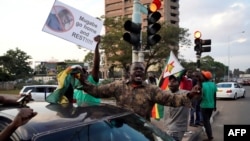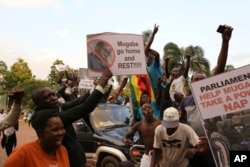The United States is urging Zimbabwean leaders to move the country towards a “genuine transition” and allow political space for the country's opposition and its people to determine their future.
During a small roundtable with State Department reporters late Monday, Acting Assistant Secretary of State for African Affairs Donald Yamamoto said the implementation of “real, genuine, economic [and] political reforms" is key to meeting the needs of Zimbabweans.
The message came hours before Zimbabwe's parliament speaker announced President Robert Mugabe had resigned Tuesday.
Yamamoto said the international community “wants to lift sanctions” against Zimbabwe, and wants to see the country play a positive political role in the stability of its neighbors.
The way for Washington to lift sanctions is for Harare to carry out the due process, to respect human rights, and to give the opposition a genuine opportunity to form a government, said Yamamoto.
“What we don’t want is a manipulation by the government or by the ruling ZANU-PF party - holding rush elections, not taking into consideration a lot of the reform issues that the opposition wants to implement; also, not giving political space for Zimbabwe people for them to express what they want to see in a new government," he said.
U.S. Ambassador to Zimbabwe Harry Thomas has been meeting with officials from ZANU-PF party and the opposition party behind the scenes to try and help push the political process forward.
US urging peaceful democratic evolution
For years, the United States has taken a leading role in condemning the Zimbabwean government's increasing assault on human rights and the rule of law, calling on the government to embrace a peaceful democratic evolution.
U.S. steps against Mugabe's rule included financial sanctions against selected individuals and entities, travel sanctions against selected individuals, a ban on transfers of defense items and services, and a suspension of non-humanitarian government-to-government assistance.
Despite strained political relations, the U.S. is the largest provider of development and humanitarian assistance to the people of Zimbabwe.
“We have about $220 million in foreign assistance to Zimbabwe, but none of that goes through the government,” said Yamamoto, adding the U.S. aid goes through NGOs, community leaders, and is focused on health care as well as economic community development.
Yamamoto indicated the U.S. foresaw last week's military’s intervention.
“You can predict, given [our] assessment in Zimbabwe,” he said, when asked by VOA if the U.S. was informed of the military intervention in advance, amid reports that China and South Africa were given a heads-up.
“The [Zimbabwean] military had made indications [of] what’s acceptable to them [in terms of Mugabe's actions, and] what’s not acceptable.”





